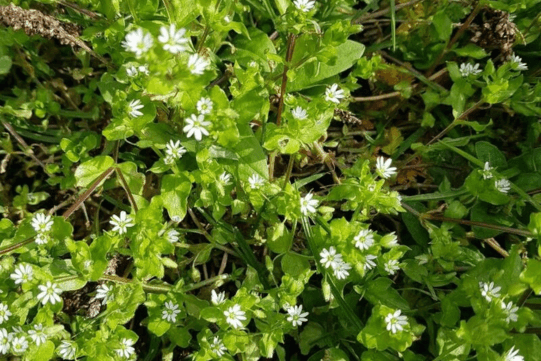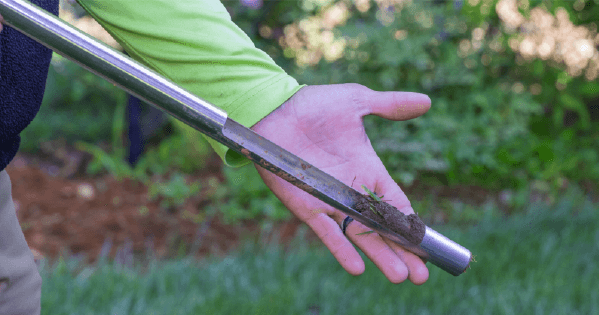Time to tackle chickweed is now

The common chickweed is an invader of Georgia lawns and gardens. Its girth can crowd out healthy vegetation including grasses and plants, so it’s important to address it quickly.
What is chickweed?
Chickweed is a common, low-growing herbaceous plant with numerous branched stems that is often considered a weed in many gardens and lawns. However, it has a long history of traditional medicinal and culinary uses, which some cultures practice today. Chickens and other birds are attracted to the plants and its seeds, therefore it was given the name chickweed.
Chickweed is native to Europe, but has become widespread in North America and other parts of the world. With heavy use of pesticides and other chemical control methods, overall, chickweed is not safe to consume.
Chickweed is a problem for Georgia homeowners because it can take over a garden or lawn quickly if it is not controlled. Because it is low-growing, it can steal nutrients, water, and sunlight, therefore smothering healthy grass and plants.
What does chickweed look like?
Chickweed has small, oval leaves arranged in opposite pairs along its stem. The plant’s smooth leaves are usually about ½ inch to 1 inch long. When in bloom, chickweed has white, star-shaped flowers with five petals. They are relatively small and typically measure around ¼ inch to ½ inch in diameter. Flowers commonly are found at the tips of the stems. The stalk of chickweed is lined with tiny vertical lines of hairs.
The roots of chickweed grow shallow, but their branches are long. It grows close to the ground, but turns up slightly toward the sun at the ends. The leaves at the top are surrounded by tiny hairs, but the leaves at the bottom are not.
Where does chickweed grow?
Chickweed forms in low-growing, spreading mats of vegetation and likes shady or moist areas, but it can also grow in full sun. It is a cool season and tends to thrive in the fall and early spring. The common chickweed tends to grow horizontally and forms large patches. It is most noticeable when it is flowering in springtime or summer.
What environment does Chickweed like best?
When soil is cool and moist, chickweed tends to thrive. It often appears in early spring or late fall, but well-established chickweed can also thrive in cool, shady areas during the summer. Chickweed is well suited to areas with partial shade, although it can grow in full sun, as long as the soil stays moist.
Chickweed likes soil with good fertility and organic matter. It often invades garden beds and cultivated areas full of nutrient-rich soil where temperatures are mild.
How does Chickweed damage your lawn?
Since chickweed grows in dense mats, it can crowd out desired grass species, which leads to a less attractive and healthy lawn. If chickweed is already established in your lawn, it likely is ready to germinate and spread. Since it likes cool, moist weather, conditions are ripe for growth.
Chickweed produces a large number of seeds (up to 30,000), which can be spread through wind, water, or attaching to animals or clothing.
How can you control Chickweed?
If chickweed becomes a problem for your Georgia lawn or garden, there are ways to keep it under control. In the beginning, when first detected, it can be removed manually, as long as the roots are dug up completely. The best methods of removing areas of chickweed is by hand or hoe, as long as it is caught early before dense patches have formed. Herbicides can be applied to larger mats if necessary.
Spraying pre-emergent herbicides include isoxaben (Gallery), pendimethalin (Pendulum) or oxadiazon (Ronstar) is a good way to keep chickweed at bay before it springs up from the soil. If established in a lawn or garden bed, indaziflam (Marengo), prodiamine (Barricade) or metolachlor (Pennant Magnum) are effective before germination. Afterward, herbicides are not as effective and can damage surrounding plants.
For post-emergent control of chickweed (when it is sprouted and actively growing), usually is done from November to early March. This is the time for chemical control. Simply Green Lawn Care Plus experts can evaluate the situation and recommend the best plan of action to eradicate this weed.
Is it time for professional help?
Although chickweed is used as a dietary ingredient in some cultures, in the Georgia lawn or garden, it is not safe for consumption and must be dealt with before it becomes a larger problem. Chickweed is easy to identify, so as soon as it is noticed, begin the practice of hand-weeding, or removing with a hoe or shovel. If chickweed is an established pest in your yard or garden, contact Simply Green today for a consultation, and let one of our technicians take care of the problem and restore your lawn to good health.
Why Simply Green?
Simply Green is the trusted resource for keeping your Georgia lawn free of weeds and disease. Well-trained team members perform a variety of services and offer assurance your lawn is in good hands.
About Simply Green Lawn Care

Simply Green aims to provide the highest quality lawn care, mosquito control, and lawn pest control services to Georgia residents.
We are locally owned and operated which allows us to be accessible, attentive, and responsive for customers in Georgia.
Our well-trained team is easy to work with and determined to exceed expectations.
All our plant health care specialists are Georgia Department of Agriculture Certified and maintain their Category 24 applicators license.


